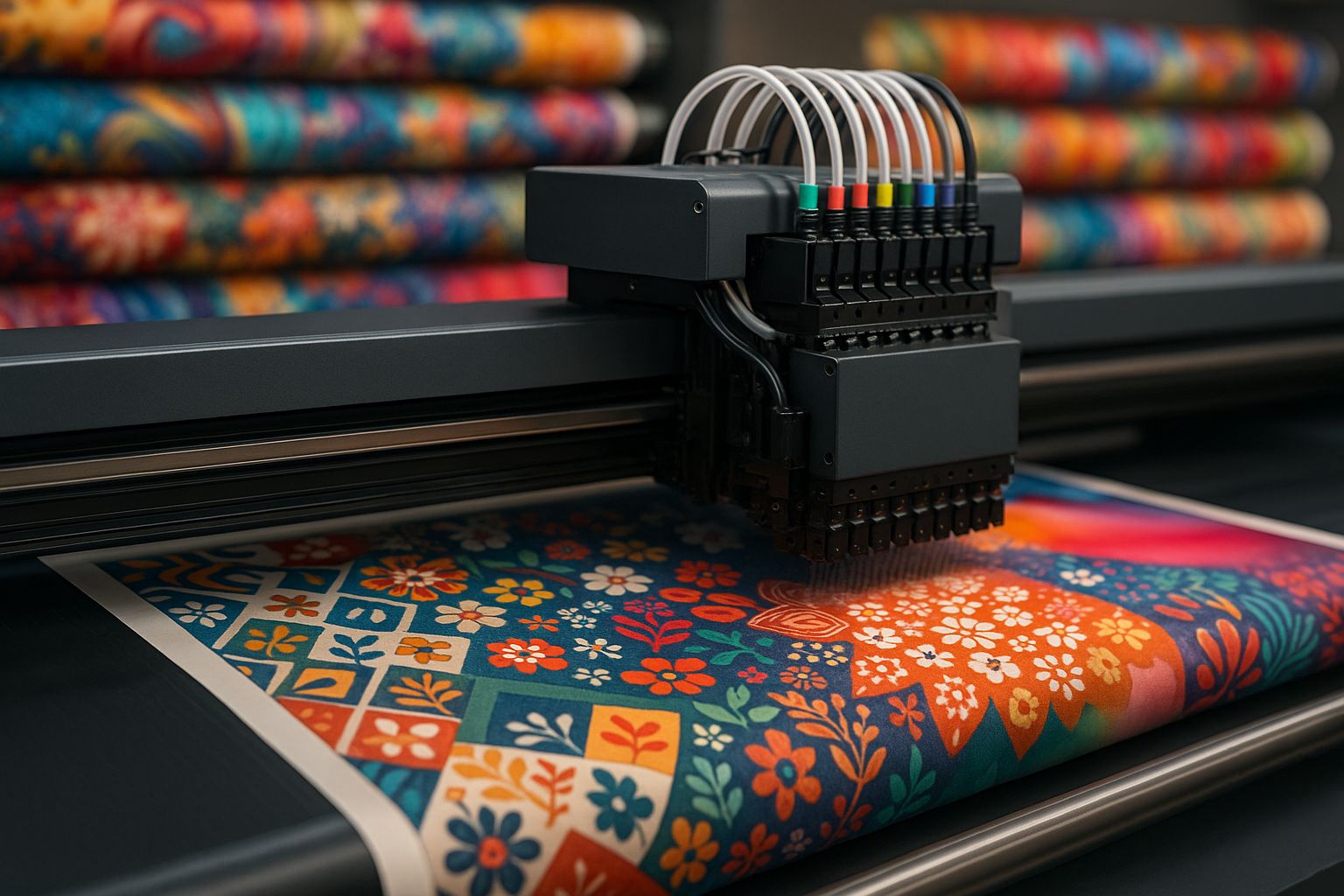⏱️ 5 min read
Leading Industry Innovation: Latest Advances in Textile Inkjet Printing Technology
Explore the latest in printing technology and discover innovative solutions for your business needs.
 By Wendy | Printing Expert
📅 August 19, 2025
🆕
By Wendy | Printing Expert
📅 August 19, 2025
🆕

Keywords: textile inkjet printing, fabric printing solutions, digital textile innovation
Abstract: This article provides an in-depth analysis of breakthrough innovations in textile inkjet printing technology, from efficient intelligent production to green environmental applications, explaining how the latest technologies meet diverse customization demands and help textile enterprises enhance market competitiveness.
Textile Inkjet Printing: Core Driver of Digital Transformation
In recent years, the global textile industry has been accelerating towards digitalization and intelligent manufacturing. Textile inkjet printing has become the core technology driving industry innovation with its high precision, versatility, and environmental advantages. Compared to traditional screen printing and heat transfer processes, inkjet technology can flexibly handle small-batch, multi-variety personalized customization needs, greatly improving production efficiency and design freedom.
According to the latest data from the International Textile Machinery Association (CEMATEX), the global digital printing equipment market reached 2.8billionin2023,withinkjetprintingtechnologyaccountingforover602.8 billion in 2023, with inkjet printing technology accounting for over 60% of the market share, expected to reach 2.8billionin2023,withinkjetprintingtechnologyaccountingforover603.5 billion by 2025.
Technological Innovation Breakthroughs: Dual Enhancement of Precision and Efficiency
Printhead technology innovation is the key factor driving industry development. New-generation piezoelectric printheads adopt MEMS (Micro-Electro-Mechanical Systems) technology, with droplet precision reaching 1.5 picoliters and resolution improving to 2400dpi, ensuring the fineness and color layering of printed patterns. Meanwhile, multi-channel parallel jetting technology has increased production speed to 150 square meters per hour, meeting large-volume production demands.
In terms of intelligent ink formulations, reactive dyes, disperse dyes, and pigment inks have achieved comprehensive optimization in color saturation, penetration, and color fastness. Particularly, new nano-pigment inks not only enhance color vibrancy but also strengthen UV resistance and wash durability, enabling printed products to maintain excellent quality in harsh environments.
Automated control systems integrate machine vision, artificial intelligence algorithms, and IoT technology to achieve full-process data visualization management. From color matching and pattern registration to quality inspection, the system can automatically adjust parameters to ensure efficient quality output while reducing manual intervention and defect rates.
Application Field Expansion: From Traditional to Functional Textiles
In terms of application scope, fabric printing solutions have expanded from traditional cotton, linen, and silk natural fibers to polyester, nylon synthetic materials, and functional textile fields.
In the garment customization market, inkjet printing technology supports flexible production from single pieces to thousands of units, meeting both fast fashion brands and high-end customization needs. European renowned sports brand Adidas uses digital printing technology to produce limited edition jerseys, achieving rapid delivery from design to finished product within 7 days.
In the home textile decoration field, inkjet printing demonstrates advantages of rich colors and fine patterns on curtains, bedding, carpets, and other products. American home textile giant Mohawk Industries improved carpet printing efficiency by 40% and increased product diversity by 300% through introducing industrial-grade inkjet printing equipment.
Technical textile applications cover professional fields including automotive interiors, medical supplies, and filtration materials. Inkjet technology can achieve precise application of special coatings such as antibacterial, waterproof, and flame-retardant on functional fabrics, enhancing product added value.
Green Manufacturing: New Standards for Environmental Sustainability
As global requirements for environmental protection and sustainable development become increasingly stringent, inkjet printing technology shows outstanding performance in green manufacturing. The widespread application of water-based eco-friendly inks effectively reduces VOC (Volatile Organic Compounds) emissions, complying with EU REACH regulations and US EPA standards.
Water and energy saving advantages are significant: traditional printing processes require 60-100 liters of water per meter of fabric for cleaning and post-processing, while inkjet printing only needs 5-15 liters, achieving over 80% water savings. Meanwhile, direct printing processes without steaming or washing reduce energy consumption by 50%, significantly lowering production costs.
In terms of waste reduction, on-demand jetting technology avoids ink waste in traditional printing, reducing waste generation by over 90%. Production data from German textile equipment manufacturer Zimmer Bensberg shows that customers using inkjet printing have reduced average waste costs by 65%.
Market Prospects: Flexible Production Leading Future Trends
Flexible manufacturing capability is the core competitive advantage of inkjet printing technology. Enterprises can quickly adjust production plans according to market demand, seamlessly switching from sample making to batch production, effectively reducing inventory pressure and market risks.
Customer cases from Italian textile printing equipment supplier MS Printing Solutions show that after adopting digital inkjet printing systems, order response time shortened from the traditional 14 days to 3 days, with customer satisfaction increasing by 35%.
Under globalization trends, inkjet printing technology supports remote design transmission and localized production, helping enterprises achieve a “design globally, produce locally” business model, reducing logistics costs and trade risks.
Conclusion: Embrace Technological Innovation, Win Market Opportunities
The continuous innovation of textile inkjet printing technology is reshaping the global textile printing industry landscape. From technological breakthroughs to application expansion, from environmental requirements to market demands, inkjet printing provides enterprises with powerful solutions.
Choosing technically advanced and professionally serviced inkjet printing equipment partners will become a key strategic decision for textile enterprises to achieve digital transformation, expand international markets, and enhance competitive advantages. Seizing technological innovation opportunities is essential to remain invincible in fierce market competition.

